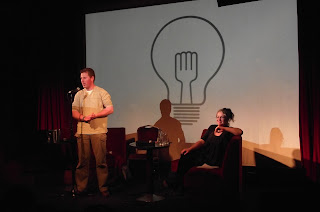Ever seen ‘Food. Inc’? Or one of Hugh Fearnley Whittingstall's Channel 4 rantings about the immense buying power that supermarkets all too often bully their producers with? It proved a hot topic at the first For Food's Sake discussion in The Sugar Club, when the audience of over 100 hungry punters burst into spontaneous applause as Pat Smith, General Secretary of the Irish Farmers' Association, focussed in on the relationship between producers, consumers and supermarkets.
“Challenges that both the consumer and the farmer need to tackle is the equity in the food supply chain. It’s definitely going against the farmer who spends two years rearing an animal to see all that effort put in then for the consumer to pay five to six times more than the farmer got.”
And it's not just the farmers who lose out, as Pat explained:
And it's not just the farmers who lose out, as Pat explained:
“I think that the consumer and the farmer get a bad deal, there is too much power being invested in a very small retail multiple. I think consumers and food production will be threatened if the current situation continues.“
Pat was quick to state the strength of Irish farmers despite the unfair position they have been put under as well as the economic climate.
“We are competitive, the farming community didn’t get the whip of the Celtic Tiger but we are resilient. We are as competitive as any producers in the world and we will continue to stay that way.”
Food journalist, Suzanne Campbell then silenced the crowd with shocking facts about the unjust distribution of wealth along the Irish food chain. For instance when you divide the profit of a chicken the farmer only gets 10%, the contractor will get 30%-40% while 50% goes to the retailer.
“The growers get 58c a bird, the cost of a packet of crisps for a live animal that is born on the farm. The retailers are getting so much more. So every single item you buy the person at the beginning at the chain gets the least amount and in terms of Irish producers its [it's] particularly bad. Irish milk can go down to 30c a litre; milk is basically cheaper than bottled water. Again it is a live animal, it has to give birth, be fed and housed.”
For more on this, check out Suzanne’s investigative report on plight of Irish chicken producers: http://www.irishtimes.com/newspaper/features/2011/0329/1224293291679.html.
Suzanne reinforced Pat's points about the perils of the unfettered buying power of supermarkets. The likes of Tesco and Dunnes can create a one sided affair at the negotiations table and it’s not in the farmers favour.
“They force discounts on the farmers, the supermarkets will take X and leave Y, then the next time they will take it off someone else. Contracts are verbal, nothing is written down. They force buy-one get-one-free deals that can cost the producer hugely.”
It is obvious that changes need to be made to protect farmers in Ireland along with the consumer from the industrial might of supermarkets.
“There were several moves made by the old government but it will be interesting what the new coalition will do about the inaccuracies,” concluded Suzanne. “As long as the consumer has to pay more the supermarkets will keep control on how they price things and their dynamic in the food chain will continue to be too dominant.”




